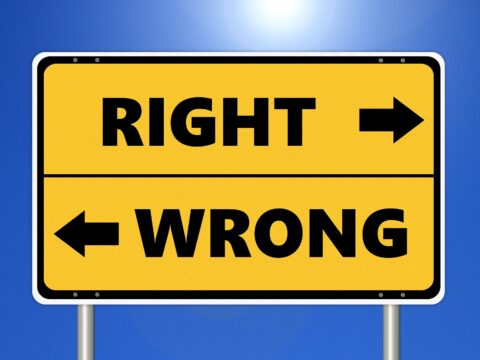Philosophers have struggled to define morality and identify a universally acceptable basis for it for thousands of years. The temporal rights paradigm provides a simple and powerful new foundation that is described in A New Basis for Old Morality. In the little essay before you, I will touch on the historical bases of morality so as to put the new basis into a clearer perspective. These fall into two great categories: religious and philosophical.
Religious Morality
This type of morality simply states that something is good or evil, right or wrong because God said so. This is a powerful basis but only for those who believe in God.
The Religious/Secular Problem
We often arbitrarily divide things into two categories: secular and religious. Just as an aside in this discussion of morality, I want to point out that this is a false dichotomy. There really is no such thing as a secular law, for example. Likewise, there is no such thing as secular morality. For more on that topic read Believer, Non-believer, the False Dichotomy.

Philosophical Morality
These are attempts to define and promote some basis for morality, or to define good and evil. They are all theories, in one form or another, based on what I call “motherhood and apple pie” arguments. They are sophisticated elaborations of ideas drawn from many aspects of life. There are branches to this topic, but for my purposes here I will focus on what is called the “normative ethics” division, the portion that focuses on right and wrong. This group is further divided into three branches known as deontology (what is our duty or obligation), utilitarianism (what actually works best for a moral structure), and virtue ethics (morality based on the human virtues).
As you can sense from the description of these branches, they all provide bases for morality based on an interpretation of various aspects of life. Who can say that duty is more important than virtue, or that what works best is what we should accept? Thus my somewhat simplistic statement above that they are all “motherhood and apple pie” arguments. Nonetheless, it is useful to dip into this pool of ideas briefly so as to illustrate the power of the morality provided by #temporalRIghts. A quote from a respected philosophical source will suffice.
What an “Expert” Says Shows the Mushy Basis of Traditional Philosophical Morality
“Many philosophers in normative ethics investigate ethical theories the aim of which is to systematically describe what makes acts right and wrong. These theories include utilitarianism, consequentialism, Kantian theories, contractualism, contractarianism, virtue ethics, various pluralist views, natural law theory, and so on. Normative ethics also covers various other middle-level topics in moral philosophy such as the nature and commensurability of moral values, the justification of moral constraints and options, the existence of moral dilemmas; desert, natural rights, the Doctrine of Doing and Allowing, and the Doctrine of Double Effect, the connection between evaluative notions such as goodness and deontic notions such as reasons, egoism and altruism, virtues and vices, promises and agreements and so on.”
“Of course, all important figures in the history of philosophy ever since Plato (Plato & Shorey 2000) and Aristotle (Aristotle & Ostwald 1962) have written on various topics in normative ethics. Furthermore, many of the central theories in normative ethics originate from the greats in the history of philosophy, for example from philosophers such as Hobbes (Hobbes 2006), Hume (Beauchamp 2006), Kant (Kant 1785), Bentham (Bentham 1780), and Mill (Mill 1987). However, normative ethics only began to develop as a field of its own after metaethics and applied ethics were introduced as new independent areas of inquiry. At the same time, John Rawls revigorated first-order normative theorizing in philosophy (Rawls ms). The contemporary key works in the area defend various ethical theories such as consequentialism (Kagan 1989 and Portmore 2011), rule-consequentialism (Hooker 2000), Kantian ethics (O’Neill 1989 and Korsgaard 1996), virtue ethics (Crisp & Slote 1997), and contractualism (Scanlon 1998). Other significant works investigate questions such as, for example, the connections between different ethical theories (Parfit 2001), deontological distinctions (Kamm 2007), and the paradoxical nature of moral constraints and moral freedom (Scheffler 1994).” Quoted from https://philpapers.org/browse/normative-ethics.
It should be apparent from the quote above that normative ethics has a long, convoluted, and sophisticated tail.
In sharp contrast with this stands the morality based on temporal rights: evil is any violation of temporal rights and good is complete deference for those rights. That’s the whole theory. Simple. Powerful.
As of today, January 23, 2023, most of this blog is on the topic of temporal rights, or at least my ruminations as I worked my way to their discovery. For more read An Introduction to Temporal Rights or Even Rocks Have Rights.
Why the Ivory Towers Will Never Adopt This
There is little hope for the acceptance of this new definition of morality for the following reason: if the big minds in the system should adopt it, all their years of study, their degrees in philosophy, the thousands of papers that have been written on the subject, all that will instantly become outdated and obsolete. Only the most humble will have the courage to do that to themselves. The sophistry in the system will surely do all it can to ridicule and dismiss one so simple and powerful as a morality that simply says “evil is a violation of rights”.
But tell me, can you find an evil that is not a violation of rights? If so, shoot me a comment below.




1 thought on “The Traditional Basis for Morality”